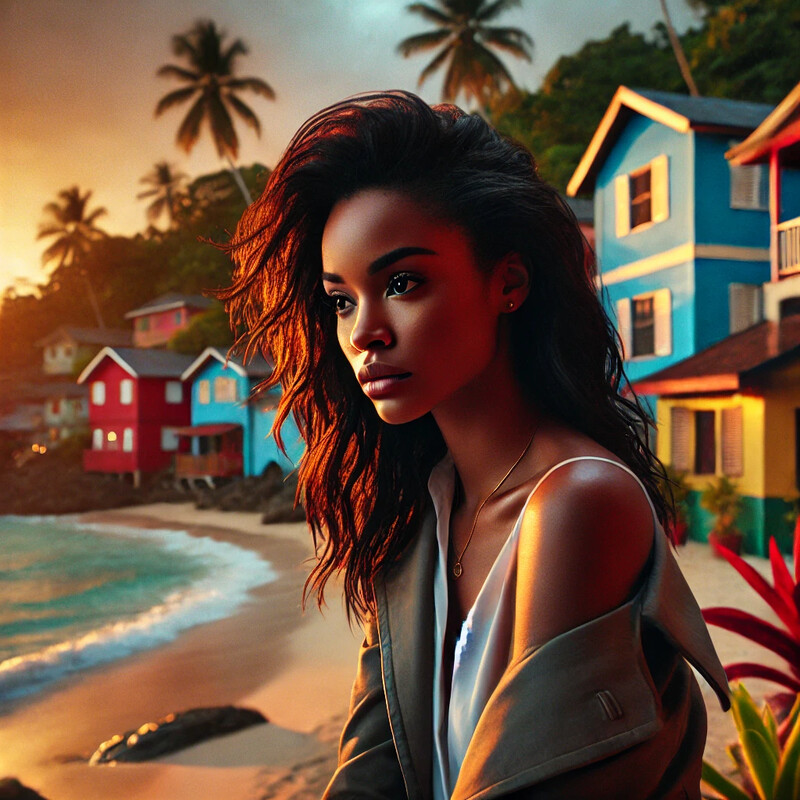Sardia Robinson
Thank you Sardia for taking the time to answer all of our questions. We are grateful for everything you have shared with us. At Oxford Script Awards we are wishing you a huge success with your next projects. Keep up the amazing work!
I was born and raised in Jamaica, where the vibrant culture and storytelling traditions first sparked my passion for the arts. As a child, I was already writing and performing skits for my friends, and I even landed my first professional role on the beloved Jamaican children’s show Ring Ding with Miss Lou. After earning a BA in Theatre from Columbia College in Chicago, I made the bold move to Los Angeles to pursue my acting dreams. Not one to wait for opportunities to come knocking, I channeled my life experiences into my first writing gig, a deeply personal one-woman show titled From a Yardie to Yankee. This production not only chronicled my journey from Jamaica to America but also became a form of therapy, allowing me to transform personal challenges into powerful art. In my ongoing career, I’ve been honored with accolades such as the Innovative Woman in Theatre Award at the Hollywood Fringe Festival and best solo production from BroadwayWorld. Today, I continue to push boundaries in both theatre and film, dedicated to shifting the narrative for Jamaicans in Hollywood and bringing diverse, genuine characters to life on stage and screen.
Every day, I write, it’s my sanctuary, my happy place where I can truly be myself. I love people watching; observing the unique quirks and subtle interactions around me inspires the characters I create. I strive for authenticity in my work, crafting characters that resonate with the audience and feel like real people. Writing demands discipline and focus, which is why I start my mornings with yoga. That quiet time not only clears my head but also opens the door to unexpected ideas. Sometimes, a fleeting thought during a pose or a snippet from a conversation sparks a new story. After all, stories are everywhere, you just have to look a little closer.
I had an idea about writing a crime drama centered on a protagonist whose sister was murdered, a story where the hunt for the killer becomes both a quest for justice and a journey into the depths of unresolved grief. I decided to write this story as an homage to my sister, who was tragically taken from us in Chicago. At first, the process was exhilarating; my passion for crime dramas fueled every page, and I felt a creative release in unraveling intricate mysteries on paper. However, as the narrative unfolded, I began to feel an overwhelming tide of emotion. Every clue, every shadowed alley in Chicago’s gritty backdrop, stirred memories and feelings I had long suppressed. It wasn’t just a fictional hunt for a murderer, it became a personal odyssey where the act of writing forced me to confront the pain of my loss. I realized that beneath the thrill of the chase, I had not truly grieved my sister’s passing. The process was as challenging as it was cathartic, blurring the lines between narrative and reality.
For me, it’s everything. It’s the heartbeat of any creative work, the thing that lingers long after the last page is turned or the credits roll. A great story isn’t just about plot; it’s about the people, the emotions, the moments that feel so true they stay with you. It’s about connection, between characters, between audience and creator, between ideas that challenge and inspire. Story is what makes me feel, think, and create. It’s what keeps me coming back, chasing that next great narrative that’s waiting to be told.
Uncertain, for sure. There’s streaming services, AI, the box office, each reshaping the industry in ways we’re still trying to grasp. And then there’s production costs, always rising, always a factor. I’m not sure where screenwriters carve out a living in all of that, but one thing remains true: the show must go on. Stories will always need to be told, and writers will always find a way to tell them.
When I write for different genres and audiences, I start by immersing myself in the world of that particular genre, watching, reading, and analyzing what makes it work. Every genre has its own rhythm, structure, and audience expectations, so I make sure to honor those while still bringing something fresh to the table.
I love feedback and I’m always open to constructive criticism, that’s how I learn and grow as a writer. I’m the queen of rewrites. But as Brené Brown says, ‘If you are not in the arena getting your ass kicked on occasion, I am not interested in or open to your feedback.'”
I’m currently working on my pitch deck and proof of concept for my crime drama Valentine, and I couldn’t be more excited. I’ve spent years developing this project to get it to where it is now. I was watching Diane Warren on MasterClass, and she mentioned that every time she finishes a song, she calls the artist and says, “This is the best thing I’ve ever written.” So, I’m claiming that energy, because Valentine is the best thing I’ve ever created.
Wow! That’s a hard one. I don’t think I have an answer for that, but one thing for sure is that storytelling will always be the core of screenwriting, no matter how the medium evolves. As technology advances, we’re seeing new ways to tell stories, whether it’s through AI-assisted writing, immersive VR experiences, or interactive narratives where audiences have a say in the plot. At the same time, audiences are craving authenticity more than ever. The industry is shifting toward stories that reflect real, diverse experiences, and that means screenwriters who bring their unique voice and perspective will be in high demand. No matter how formats change or how tech influences the process, one thing remains constant: great stories need great writers. And that’s not changing anytime soon.
If you go to bed thinking about it and wake up thinking about it, then it’s calling you, so do it. We are here to create. Our stories matter, our voices matter. Stay disciplined, stay focused, and shut out the noise. No more doubts. No more waiting. Just write.

